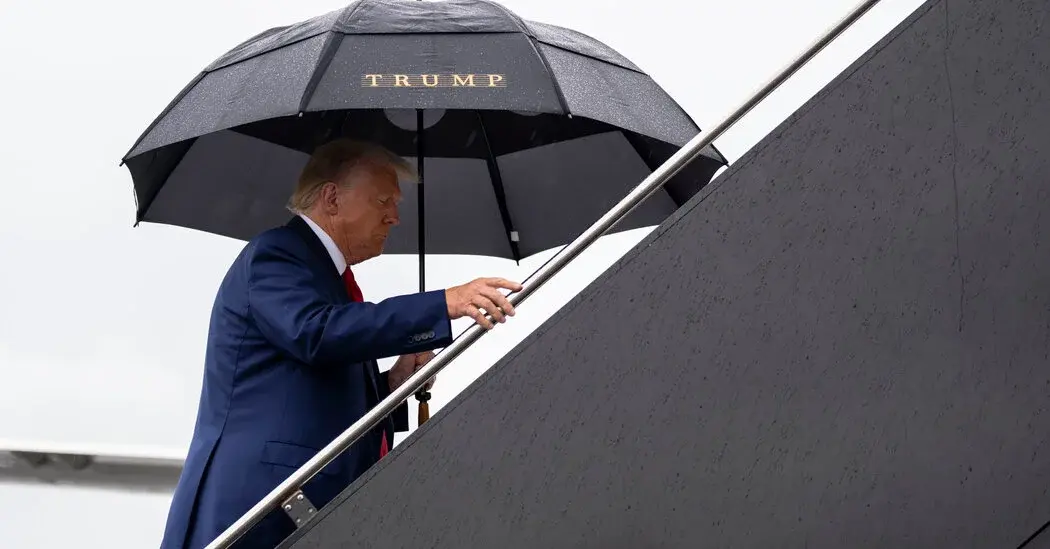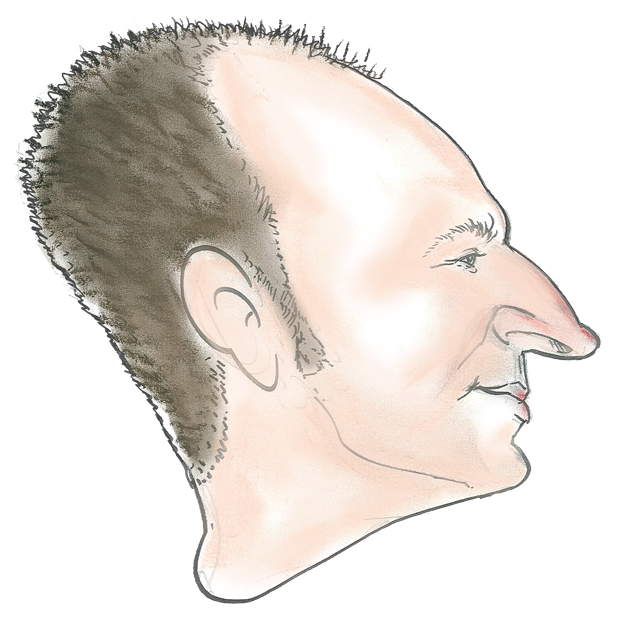NYT gift article expires in 30 days.
Okay this snippet is absolutely brilliant:
(Professor Calabresi has occasionally strayed from conservative orthodoxy, leading to an unusual request from the group he helped found. “I have been asked not to talk to any journalist who identifies me as a co-founder of the Federalist Society, even though it is a historical fact,” he said. I noted the request and ignored it.)
Identity politics 😀
The tldr here is this:
These constitutional scholars dug into the original meaning of the 14th amendment and concluded that Trump easily meets the bar for having “engaged in” the Jan 6th insurrection, thereby disqualifying him from holding office.
I believe it all comes down to the term “engaged in”. Some say he didn’t because he was not literally storming the capital with the rioters. These two law professors are arguing (in a peer reviewed law journal) that the original intent of that term includes all the stuff Trump did.
What does the 14th amendment say about how it should be applied if half of the supreme court judges are co-conspirators?
Section 3. No person shall be a Senator or Representative in Congress, or elector of President and Vice President, or hold any office, civil or military, under the United States, or under any State, who, having previously taken an oath, as a member of Congress, or as an officer of the United States, or as a member of any State legislature, or as an executive or judicial officer of any State, to support the Constitution of the United States, shall have engaged in insurrection or rebellion against the same, or given aid or comfort to the enemies thereof. But Congress may, by a vote of two-thirds of each House, remove such disability.
(Emphasis naturally not in the original.)
It depends on if you can claim they gave aid or comfort to the people storming the capitol. Many of the justices might be questionable for other reasons, but unless they were actively there or publicly supportive of it, I don’t think they’d qualify. Plus, who’s going to rule on it, the other justices?
That being said, in 2022, there was a case of a politician in New Mexico being barred from public office for life for being supportive of Jan 6th. Apparently it’s the first time this has happened since 1869 (and remained upheld).
Expect multiple lawsuits if this paper’s conclusions are acted upon.
“Section 3’s disqualification rule may and must be followed — applied, honored, obeyed, enforced, carried out — by anyone whose job it is to figure out whether someone is legally qualified to office,” the authors wrote. That includes election administrators, the article said.
Professor Calabresi said those administrators must act. **“Trump is ineligible to be on the ballot, and each of the 50 state secretaries of state has an obligation to print ballots without his name on them,” **he said, adding that they may be sued for refusing to do so.
[…]
“The question of should Donald Trump go to jail is entrusted to the criminal process,” he said. “The question of should he be allowed to take the constitutional oath again and be given constitutional power again is not a question given to any jury.”
I loathe Chris Christie with every fiber of my being but I will buy him a pair of Springsteen tickets if he files this suit.
originalism, the method of interpretation that seeks to determine the Constitution’s original meaning
In no way I’d like to help Trump, but you US guys really should NOT re-re-interpret laws suddenly as they were intended 200 years ago.
When you’ve got an outdated document as the backbone of your whole legal system, you kinda have to re-re-interpret everything, no matter what. Originalists tend to be pretty conservative, it’s just a method of thinking that allows conservative lawyers/judges/legal people to slap some legitimacy onto their interpretations. It’s an alternative to the modern (centrist) interpretation of law in the US, which has in recent years allowed for things like gay marriage. However the flavor of conservatism is very “traditional” compared to the modern alt-right, meaning they are also often anti-trump.
Imagine if we made new laws that evolved with the time and retired old laws that are clearly anachronistic?
If instead of interpreting and discussing unclear text the legislators just said “we believe this is wrong, and thus - now we change it”.
That’s the job of Congress.
But the Supreme Court can also down those laws too. That was what conservatives attempted with the Affordable Care Act .
Sorry if I was unclear; I was trying to say “imagine if you had a system that worked” 🫣
And I don’t mean that in any negative way, other than to say that the current system is visibly broken.
That is technically what the amendments are, but it’s so much harder to push an amendment through congress than it is to just argue that the constitution already agrees with what you want to happen
Especially since the “originalists” are being quite disingenuous. They’ve wanted for quite a while to start a new Constitutional Convention to rewrite the thing from scratch. They don’t really respect the founders as much as we think they do. They want to become the new founders, and force their great-great-grandchidren into boxes they make.
Agreed, and if they re-interpret the Constitution completely from the original meanings you might even revive slavery. Well, surely they can’t, and that shows how arbitrary the originalist position is.
can’t load the page
`Two prominent conservative law professors have concluded that Donald J. Trump is ineligible to be president under a provision of the Constitution that bars people who have engaged in an insurrection from holding government office. The professors are active members of the Federalist Society, the conservative legal group, and proponents of originalism, the method of interpretation that seeks to determine the Constitution’s original meaning.
The professors — William Baude of the University of Chicago and Michael Stokes Paulsen of the University of St. Thomas — studied the question for more than a year and detailed their findings in a long article to be published next year in The University of Pennsylvania Law Review.
“When we started out, neither of us was sure what the answer was,” Professor Baude said. “People were talking about this provision of the Constitution. We thought: ‘We’re constitutional scholars, and this is an important constitutional question. We ought to figure out what’s really going on here.’ And the more we dug into it, the more we realized that we had something to add.”
He summarized the article’s conclusion: “Donald Trump cannot be president — cannot run for president, cannot become president, cannot hold office — unless two-thirds of Congress decides to grant him amnesty for his conduct on Jan. 6.”
A law review article will not, of course, change the reality that Mr. Trump is the Republican front-runner and that voters remain free to assess whether his conduct was blameworthy. But the scope and depth of the article may encourage and undergird lawsuits from other candidates and ordinary voters arguing that the Constitution makes him ineligible for office.
“There are many ways that this could become a lawsuit presenting a vital constitutional issue that potentially the Supreme Court would want to hear and decide,” Professor Paulsen said.
Mr. Trump has already been indicted twice in federal court, in connection with his efforts to overturn the 2020 election and his retention of classified documents. He is also facing charges relating to hush money payments in New York and may soon be indicted in Georgia in a second election case.
Those cases could give rise to prison time or other criminal punishment. The provision examined in the new article concerns a different question: whether Mr. Trump is eligible to hold office.
There is, the article said, “abundant evidence” that Mr. Trump engaged in an insurrection, including by setting out to overturn the result of the 2020 presidential election, trying to alter vote counts by fraud and intimidation, encouraging bogus slates of competing electors, pressuring the vice president to violate the Constitution, calling for the march on the Capitol and remaining silent for hours during the attack itself.
“It is unquestionably fair to say that Trump ‘engaged in’ the Jan. 6 insurrection through both his actions and his inaction,” the article said.
Steven G. Calabresi, a law professor at Northwestern and Yale and a founder of the Federalist Society, called the article “a tour de force.”
But James Bopp Jr., who has represented House members whose candidacies were challenged under the provision, said the authors “have adopted a ridiculously broad view” of it, adding that the article’s analysis “is completely anti-historical.”
(Mr. Bopp’s clients have had mixed success in cases brought under the provision. A state judge, assuming that the Jan. 6 attacks were an insurrection and that participating in them barred candidates from office, ruled that Representative Marjorie Taylor Greene, Republican of Georgia, had not taken part in or encouraged the attacks after she took an oath to support the Constitution on Jan 3. A federal appeals court ruled against Representative Madison Cawthorn, Republican of North Carolina, on one of his central arguments, but the case was rendered moot by his loss in the 2022 primary.)
The provision in question is Section 3 of the 14th Amendment. Adopted after the Civil War, it bars those who had taken an oath “to support the Constitution of the United States” from holding office if they then “shall have engaged in insurrection or rebellion against the same, or given aid or comfort to the enemies thereof.”
Congress can remove the prohibition, the provision says, but only by a two-thirds vote in each chamber.
The new article examined the historical evidence illuminating the meaning of the provision at great length, using the methods of originalism. It drew on, among other things, contemporaneous dictionary definitions, other provisions of the Constitution using similar language, “the especially strong evidence from 1860s Civil War era political and legal usage of nearly the precise same terms” and the early enforcement of the provision.
The article concluded that essentially all of that evidence pointed in the same direction: “toward a broad understanding of what constitutes insurrection and rebellion and a remarkably, almost extraordinarily, broad understanding of what types of conduct constitute engaging in, assisting, or giving aid or comfort to such movements.”
It added, “The bottom line is that Donald Trump both ‘engaged in’ ‘insurrection or rebellion’ and gave ‘aid or comfort’ to others engaging in such conduct, within the original meaning of those terms as employed in Section 3 of the 14th Amendment.”
Though the provision was devised to address the aftermath of the Civil War, it was written in general terms and continues to have force, the article said.
Congress granted broad amnesties in 1872 and 1898. But those acts were retrospective, the article said, and did not limit Section 3’s prospective force. (A federal appeals court agreed last year in the case involving Mr. Cawthorn.)
The provision’s language is automatic, the article said, establishing a qualification for holding office no different in principle from the Constitution’s requirement that only people who are at least 35 years old are eligible to be president.
“Section 3’s disqualification rule may and must be followed — applied, honored, obeyed, enforced, carried out — by anyone whose job it is to figure out whether someone is legally qualified to office,” the authors wrote. That includes election administrators, the article said.
Professor Calabresi said those administrators must act. “Trump is ineligible to be on the ballot, and each of the 50 state secretaries of state has an obligation to print ballots without his name on them,” he said, adding that they may be sued for refusing to do so.
(Professor Calabresi has occasionally strayed from conservative orthodoxy, leading to an unusual request from the group he helped found. “I have been asked not to talk to any journalist who identifies me as a co-founder of the Federalist Society, even though it is a historical fact,” he said. I noted the request and ignored it.)
Some of the evidence the article considered overlapped with what was described in the recent indictment of Mr. Trump accusing him of conspiring to subvert the 2020 election. But that case and Section 3 address “completely separate questions,” Professor Baude said.
“The question of should Donald Trump go to jail is entrusted to the criminal process,” he said. “The question of should he be allowed to take the constitutional oath again and be given constitutional power again is not a question given to any jury.”`
Spoiler, it’s a trap. Today it’s trump being removed from all the ballots for legit reasons, tomorrow it’s AOC being removed from ballots from half baked fever dreams. The GOP does not operate in good faith, they will abuse this as they see fit.





